Matthew’s Stage 3C Non-Seminoma Testicular Cancer Story
Matthew shares his stage 3C non-seminoma testicular cancer story and undergoing treatment, starting with BEP chemotherapy and ending with a rare situation: multiple surgeries.
He shares about the complications to highlight how he grew resilience from his difficult cancer experience, as well as topics like navigating hair loss, fertility preservation, the support that meant the most, and finding a new purpose in life. Thanks for sharing your story, Matthew!
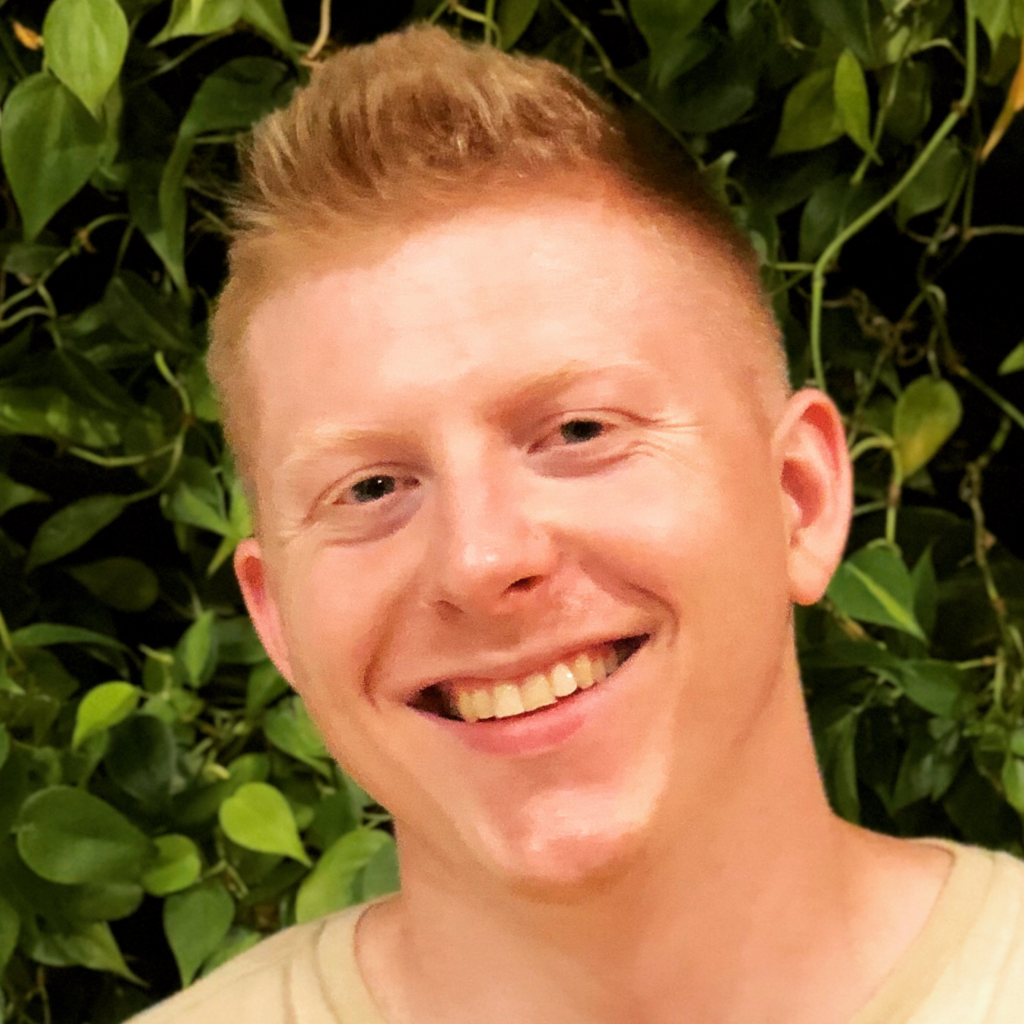
- Name: Matthew O.
- Diagnosis(DX):
- Testicular cancer
- Non-seminoma
- Stage 3C (highest possible)
- Age at DX: 24
- 1st Symptoms:
- Back pain
- Blood in vomit and bowel movements
- Treatment
- BEP Chemotherapy
- 5 rounds (typically 4)
- Surgery
- Rare complication: 4 additional surgeries
- BEP Chemotherapy
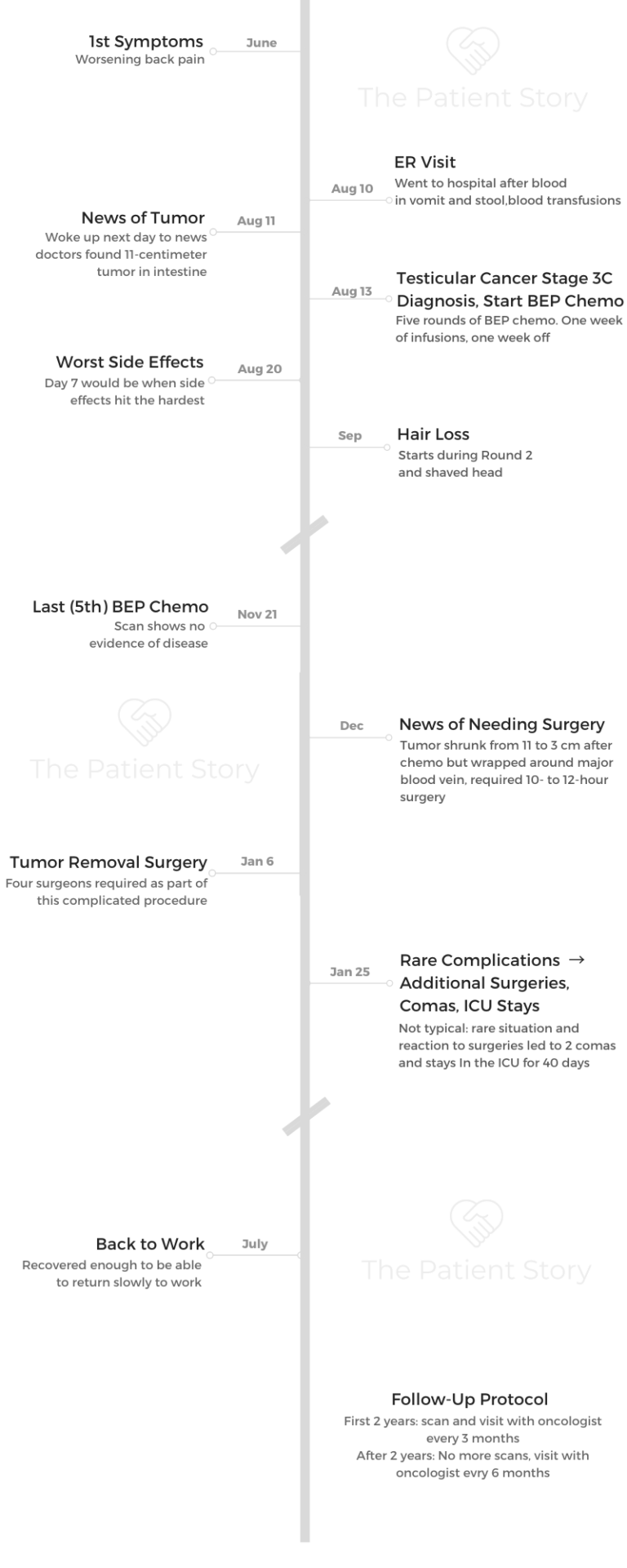
You need to be the one to have the courage to go forward. That’s where faith comes in and where you believe in yourself, having the courage to push yourself forward.
Matthew O.
- Video: Matthew on Getting Diagnosed
- Path to Diagnosis
- Testicular Cancer Diagnosis
- Before Treatment
- Video: Matthew on Chemo & Surgeries
- Chemotherapy & Side Effects
- How did doctors describe the treatment plan
- Describe the overall BEP chemo treatment plan
- What were the side effects you experienced
- When were the chemo side effects the worst
- Describe getting chemo infusions through IV
- Getting a port for last chemo round
- Guidance on getting through the near week-long hospital stays
- What was the hardest part of the chemo
- Describe managing the hair loss
- Shifting your perspective on not having hair
- Any last guidance on recovering from chemo at home
- How did you process the end of chemotherapy
- Surgery & Complications
- Video: Matthew's Reflections
- Reflections on Cancer
This interview has been edited for clarity. This is not medical advice. Please consult with your healthcare provider for treatment decisions.
Cancer can go one of two ways. You can let it define you or you can grow through it and learn through it, become a better version of yourself.
There were a lot of ups and downs, resilience and perseverance. At the end of the day, I’m very grateful for the experiences that I learned. I decided to share my story, but more importantly, the lessons I learned along the way to your audience today.
Matthew Ode
Video: Matthew on Getting Diagnosed
Path to Diagnosis
Tell us about yourself
I was a personal trainer, very healthy at the time, working out six or seven days a week, eating almost to a T, counting my calories and my macronutrients. At the time, I was a personal trainer and wellness director.
My life was dedicated to my health.
I did have anxiety. I was 24 years old, I had just gotten done with college, and had no idea what I wanted to do with my life. I think that brought a lot of anxiety to my life.
When I say anxiety, I would have panic attacks and things like that. I was able to overcome that just before I was diagnosed with cancer. My life was predicated on health.
Also, it was a few months before I was diagnosed when I met my girlfriend, Lauren, who’ll be a vital part of this story.
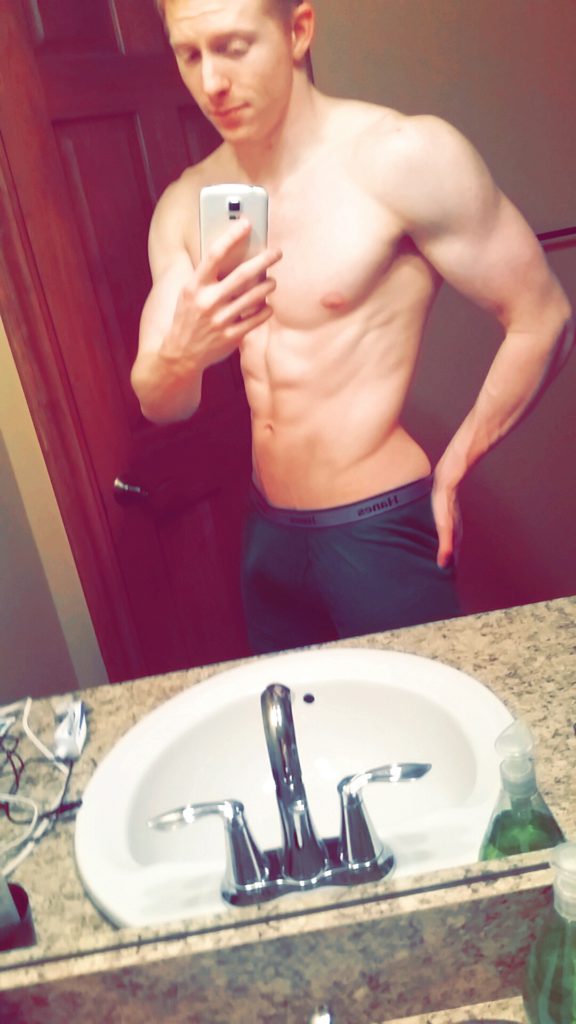
How did you learn something was wrong
I had just started dating Lauren, my girlfriend. It was around May or June. We started doing all these summer activities together. We’d go hiking, kayaking, pretty much everything, especially as a brand new couple.
All of a sudden, I started to notice these minor back pains. I was in the best shape of my life, lifting a lot, working out a lot, so I thought it had to be the workouts. As the weeks went by, as the months went by, it got worse and worse.
Of course, at 24 years old, you think you’re invincible. You’re stubborn, you don’t want to go to the doctor.
Lauren was saying I wasn’t the same person I was before. She wanted me to go to a doctor to get checked out. I didn’t want to so I scheduled an appointment with a chiropractor. They tried to adjust me but still the pain got worse.
It got to the point where it was extremely hard for me to even get up and walk. This was early August now, and I was still crazy stubborn. Every time I went places, I’d just complain about my back over and over again.
What got you to finally go to the hospital
One night I was over at Lauren’s house and I ended up puking up blood that night. Right away, that was the signal to go to the hospital.
I got rushed to the emergency room. They did a blood test on me and found I had lost two-thirds of the blood circulating in my body, which is equivalent to a gunshot wound.
They gave me six bags of blood and then rushed me into an emergency surgery to figure out what was causing the bleeding.
They thought it was an ulcer when they went into the emergency surgery and performed some blood tests. I wasn’t just puking out blood but it was also coming out in bowel movements.
When I woke up the next day after surgery, I thought I was okay. They had given me six bags of blood which really reenergized me. When I had gotten to the hospital, I could barely walk. I was so dizzy and tired, I could barely even see.
Your hemoglobin should be around 15 for a male and I was at 4.5 to 5.0. They said anything under 5.0, you shouldn’t even be awake, and I was right there.
Testicular Cancer Diagnosis
When did you get the initial cancer diagnosis
The next morning when I woke up, I’m thinking it’s all over. My doctor walks in, sits down with me, and as soon as I saw him with that blank stare in his eyes, I knew something was completely wrong.
He sits down, grabs my hand, and says, “Matt, we found an 11-centimeter tumor in your small intestine. We don’t know which cancer it is yet but we do believe it is cancer. We have to rush you to the main campus of the Cleveland Clinic immediately.”
I live in Cleveland. Thank goodness I have one of the best hospitals in the world right at my doorstep. Within a day or two, they were doing anything they could to get me to that hospital. That’s where they did a ton of tests to figure out what type of cancer I had.
They did an ultrasound, blood work, and I couldn’t tell you everything because I was out of it, in so much shock. I didn’t really know what was going on.
When did you find out what stage of cancer you had
After a day or so, they came to me and told me that I had the highest stage of testicular cancer, which is stage 3C.
A lot of people say they have stage 4 cancer, but I asked my oncologist multiple times and he said there’s actually no stage 4, it’s stage 3C.
Usually they track your blood marker, so they have what’s called your AFP marker. It’s a blood tumor marker. You want it to be under 5, I believe, to be considered okay and healthy. Mine was over 65,000. It was so high, it was off the charts.
How did you process the testicular cancer diagnosis
There is a lot of story of resilience in there. When I was first diagnosed, it was just my parents who were there at the appointment at the time. Lauren didn’t know, nobody knew, it was just me and my parents in that room.
I remember looking at my parents and they’re crying. I’m very faith-based, so I’ll share my story this way, to each their own on their faith. But I really think God put this strength in me, the second I heard that news. For some reason I told myself, I’m going to be strong for my parents, for Lauren when she gets the news, for my friends and family.
I started looking at life as everything is happening for me, not to me.
What I mean by that is if you start looking at life as everything is happening to me, you start making excuses. You start blaming other people. You start letting cancer define you.
When you start saying, “How is this happening for me?” Then you can learn and grow from it. It’s unfair and unexpected, but guess what, I am dictating my happiness throughout this journey or my mental and emotional strength.
I said I would use this as a lesson and grow through this experience. Yes, I’d have ups and downs, but I had that mindset.
»MORE: Patients share how they processed a cancer diagnosis
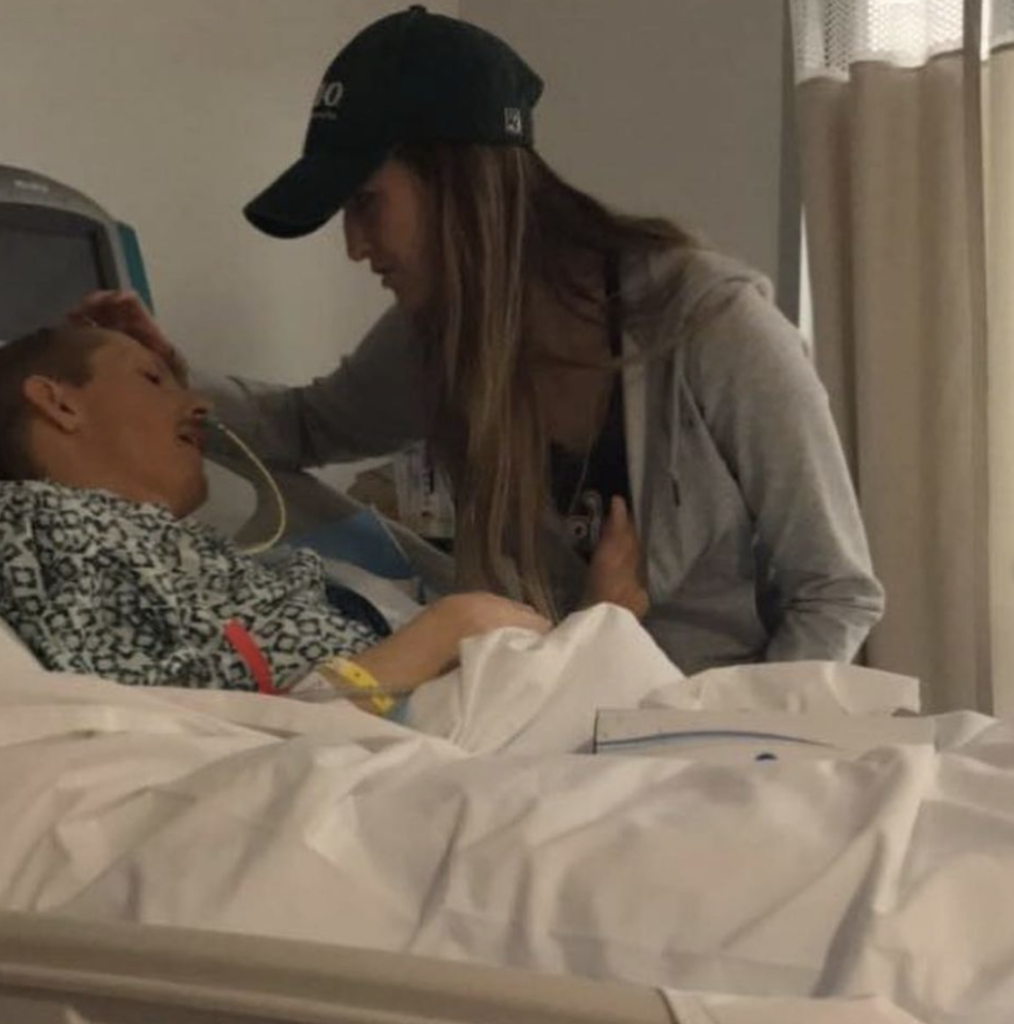
Guidance: embrace and process your emotions (especially men)
All my emotions came out when I saw Lauren. Be willing to express what you’re going through. I said I was going to be strong for my parents, Lauren, my family, and I was.
But at a point, once I got to the Cleveland Clinic is when I saw all my friends and family. Once I saw Lauren, I was so nervous because I didn’t know if she still wanted to be with me. We’d only been dating for about three months at that point. To put that burden on her, I understood if she didn’t want to be around.
Not only did she say she’d be around, she would be there every step of the way. I remember hugging her and then letting all my emotions out. It was like all this baggage that’d been on my shoulders was released.
I want to talk, especially to the men out there, it is okay to express what you’re going through, to share your vulnerability and your emotions. That is what allows us to relieve the anxiety, relieve the depression. Relieve the stress in our lives, by expressing our emotions to those we know, like, love, and trust in our lives.
That’s what I needed to do. It was a big push and it really made a difference moving forward.
How did you break the news to loved ones
My parents had gotten in contact with Lauren, so she knew about the cancer by the time she saw me. For me, the only person I called was my best friend, Anthony. That was really tough. Hearing him cry, I was still in shock so I wasn’t exactly crying.
It was really phone-tagging people left and right. There were no rooms at the Cleveland Clinic at the time, so they brought me into an ICU room. You’re only allowed to have two or three visitors in the ICU, but at the time they knew what I was going through and they had curtains around, so we had 15 people come in.
It was all my friends and family, people just flooding in, back and forth, once I got to the clinic. It really helped having such incredible people in my life.
Any guidance on how to break the news to others
I need the support. When it comes down to going through challenging moments in my life, the one thing I realized is I cannot fight these battles alone. That’s me.
I understand some people don’t want to overwhelm other people in their lives, but in my opinion, by not telling them and having them figure it out later is going to make it even worse for them.
My thought is you don’t have to tell the world, just first tell the people you really love and care about. When you feel more comfortable opening up about it, go for it.
Between my parents, Lauren, and my best friends and family, I needed that in my life. I think it’s so important because at the end of the day, these battles fought alone is not only lonely, but it’s almost impossible to get through.
»MORE: Breaking the news of a diagnosis to loved ones
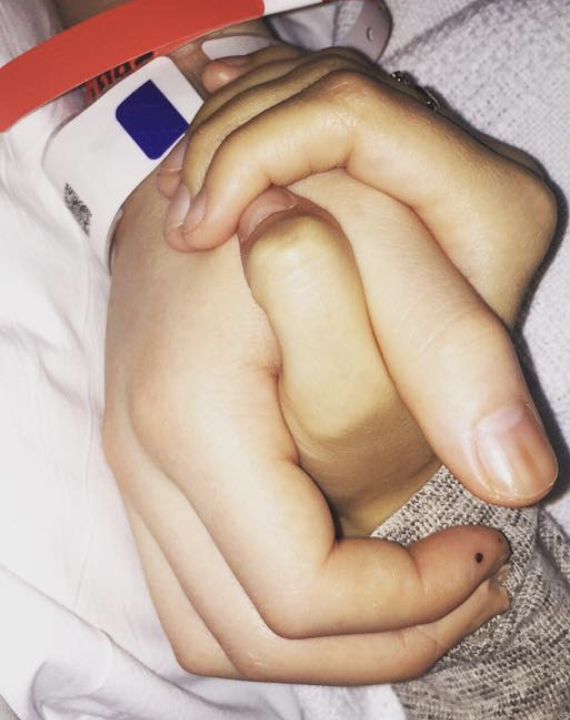
Before Treatment
Describe the ultrasound scan
The ultrasound is no different than getting one during pregnancy. They put gel on you and go across your stomach. Mine lasted a good hour. They needed to check several different areas.
I know it had to do with figuring out where certain things were forming and how they were forming, so they performed the ultrasound on my stomach and my testicles to make sure they knew where the cancer was and to spot any irregularities happening in my body.
Describe the blood work done
That had a lot to do with making sure it was not a blood-related cancer. Also, my AFP (alpha-fetoprotein) markers were detected through blood work.
They found out my AFP was crazy high, which is related to testicular cancer, so more testing gave them the avenue of figuring out that testicular cancer was what we were dealing with.
Sperm banking before treatment
As soon as they found out I had testicular cancer, they said that with surgeries and treatment, there was more than a 50-percent chance that once I went through it all, I might not have kids. At least not in the natural way.
So I went through two rounds of sperm banking. It’s awkward but you get it done. I think it’s so important. It can get expensive, but you have to look at it this way.
If you’re looking at kids and you want to have a future with your own gene and genetics, do it.
It’s a tough decision. It was weird. I had only been dating Lauren for three months. They wanted us to have this conversation with each other.
I was like okay, I guess we’re going to have this conversation then. She and I talked and figured we absolutely needed to do this. We hadn’t been talking about kids before that time.
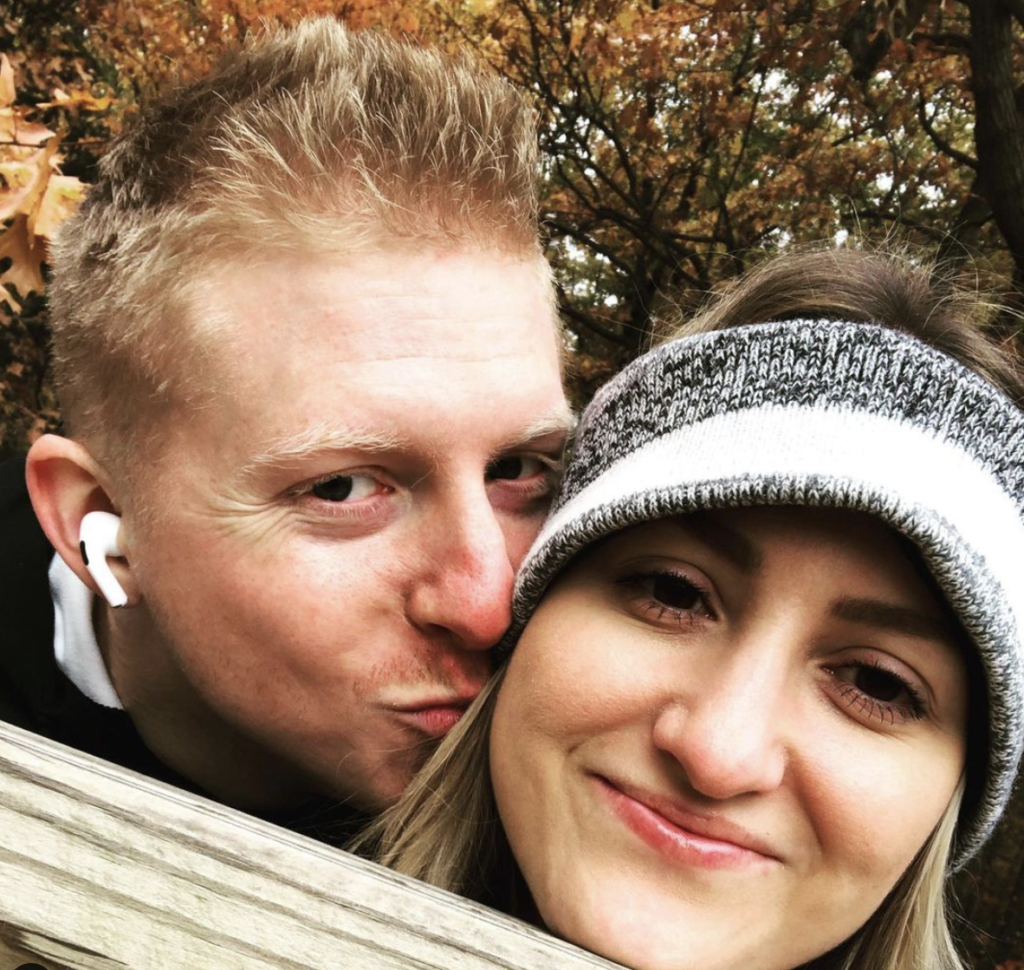
How did you find where to go for sperm banking
Cleveland Clinic did it for me, they have everything set. They do everything. So the medical team said they had me there, they’d get me in the right place. We haven’t talked to the fertility specialist yet, but we will soon, most likely within the next couple of years.
I’m not sure of all hospitals, but I think most big hospitals will at least point you in the right direction or they have the facilities there.
Any guidance on paying for the procedure
I was very lucky because my parents basically said they’d take care of this for me. I don’t know the exact cost but I know it’s about a couple-hundred a month to store it.
Video: Matthew on Chemo & Surgeries
Chemotherapy & Side Effects
How did doctors describe the treatment plan
With the clinic, they’re so incredible they have a couple specific testicular cancer oncologists. They linked me up with the best one they could get, Timothy Gilligan. He’s a great guy and very personable.
I was immediately put on what’s called BEP chemotherapy, which is bleomycin, etoposide, and cisplatin. They did not hesitate. When they found out I had testicular cancer, I was on the chemo that day.
They said they needed to get me into the chemo room and kept me in the hospital room for six days to make sure there was no complication.
They didn’t want to see anything go wrong with the chemo and wanted to make sure it was doing its job, as well.
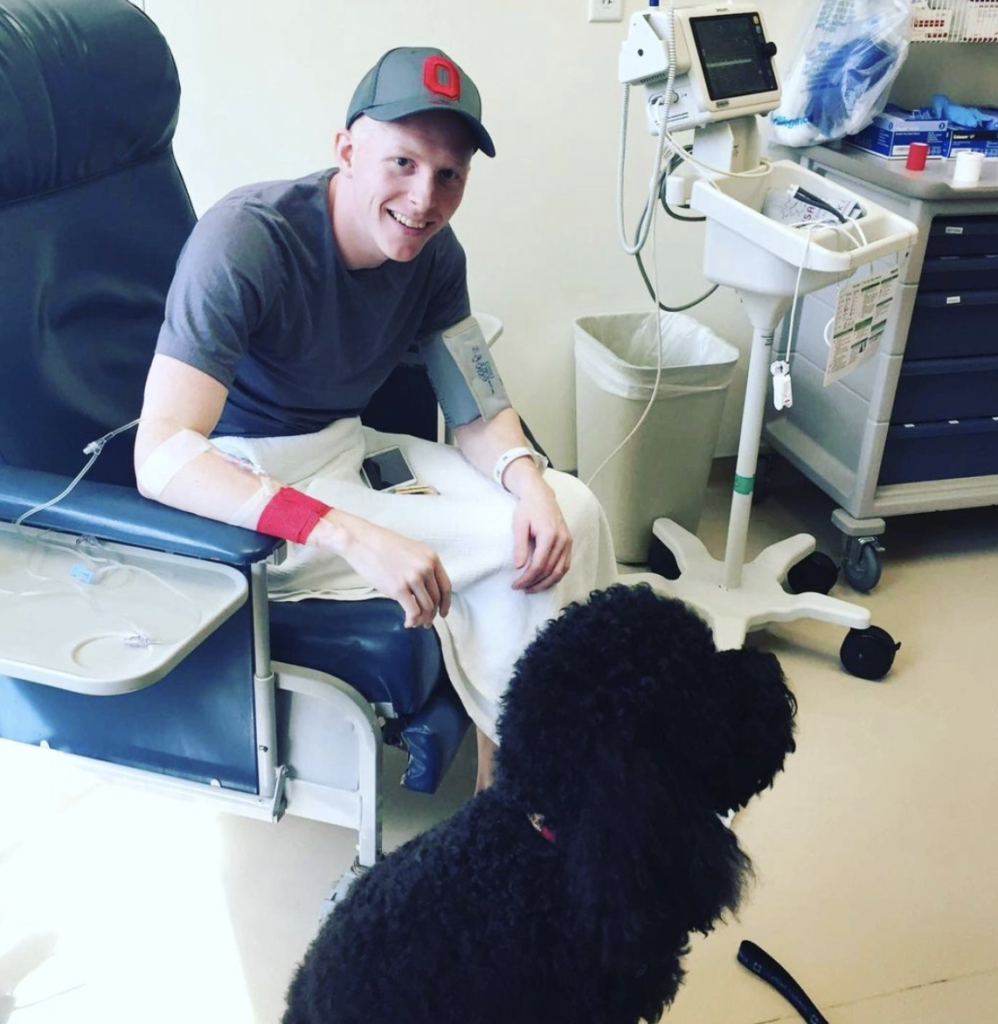
Describe the overall BEP chemo treatment plan
I ended up going through five rounds of BEP. Since my testicular cancer was so aggressive, they had to add an extra round. They usually do four rounds of BEP chemo.
There were five days, Monday through Friday, of etoposide and cisplatin. Then I had just one Monday of bleomycin because it’s a very strong drug. It really hits your lungs hard in your body.
Then you get a week off, and then repeat it all over again. So it was a two-week process, five rounds, lasting two-and-a-half to three months.
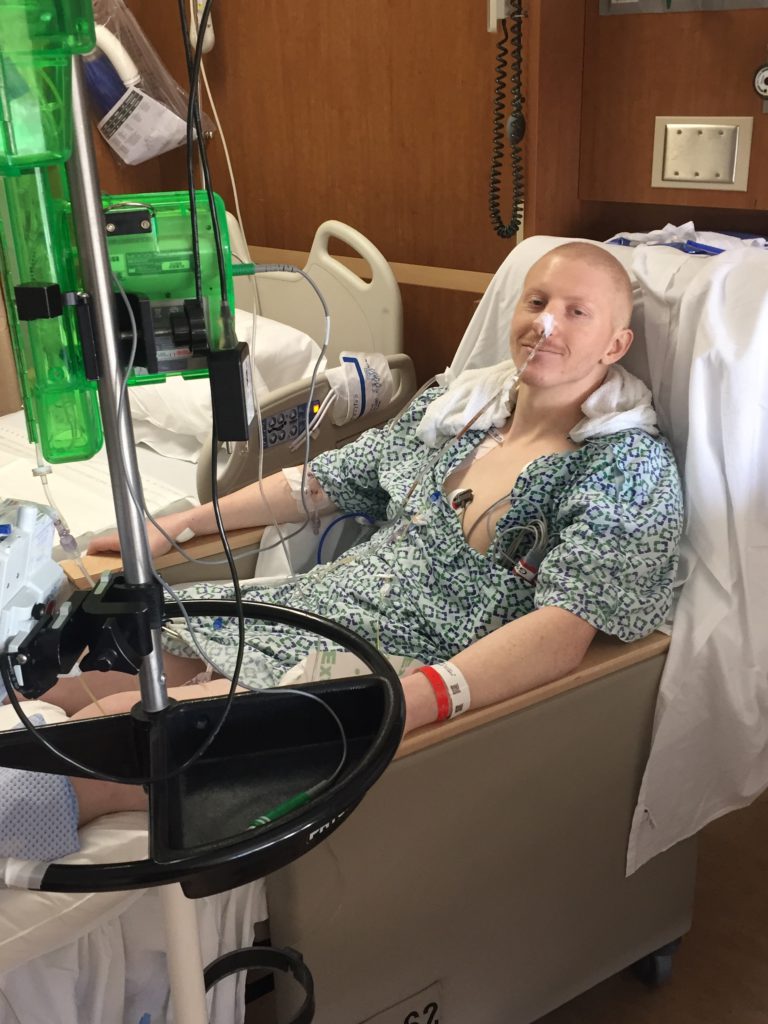
What were the side effects you experienced
Monday through Friday the first round, toward Friday I could feel it for sure. I started feeling tired and a little week. On Day 6, I was like okay, I’m not feeling great but I can walk a little bit.
Then Day 7, I was a total train wreck. When I say fatigue, I mean not getting out of bed.
Number two, they constantly put me on nausea medication so I was really lucky because I’ve heard crazy stories of nausea and having those symptoms. I made sure I took my nausea medicine.
Because of my anxiety, I also started to get some rashes on my stomach and my chest when I would get the chemo. This was closer to the third and fourth round.
I would remember freaking out and getting these rashes. The doctors would come in and say they looked like stress rashes, but assured me they’d pay attention to them. They’d give me ice to put on my neck and I’d calm down, then the rashes would go away.
I was also neutropenic. I couldn’t eat pure fruits or vegetables because they carried bacteria, so I could avoid getting sick.
Chemo was not easy, don’t get me wrong, I lost my hair within Round 2, but I didn’t have anything that was absolutely detrimental during chemo. I was lucky in that aspect.
When were the chemo side effects the worst
They told me Day 7 would be my worst day of side effects because what happens is all of the drugs are trying to get out of the system within a day or two, and your body is fighting everything it can.
BEP is one of the most intense chemotherapies. The reason they did it with me is because I was so young and could handle it. Day 7 comes along and I remember waking up and like, whoa, I cannot even move.
I felt like total death. At that point, they had released me on Saturday after the Monday through Friday of chemo. Sunday is when I felt so terrible and it was rough.
Describe getting chemo infusions through IV
They didn’t want to do the port in the beginning. They thought I could get through all my chemo without it. I had really good veins because of how much I lifted weights.
The first four rounds of chemo I went through was infusion by IV. They would find good veins in my arm and make sure I have good blood return, then they could put saline back into the system. Once that was all good, they would give me the chemotherapy.
The cisplatin and etoposide infusions lasted about three to four hours altogether. I’d just sit there and get pretty tired. I was extremely nervous the first day I went in but I knew that this is what I had to get done, what I needed to do.
Bleomycin was really short, maybe 15 minutes. It was not long but bleomycin is a very powerful drug. The chemo destroys everything in your body, good and bad cells.
Getting a port for last chemo round
Bleomycin is on Monday, Day 8 of my chemo, when I feel absolutely trashed. Day 7 is the worst and Day 8 is second to that.
That was the day this happened. I am in a wheelchair, I cannot walk, and am so exhausted. They go in to prick me, and they missed. They do it again and miss five times. They said they couldn’t do any more.
I was on the verge of passing out. With chemo, my veins just got shot. There was no blood return, nothing. That’s what chemo will do to you, especially ones like bleomycin that are so powerful. They destroyed my veins.
The next day my oncologist told me I needed to get a port and then they’d get me onto chemotherapy. I went in for the port surgery, got it done, and it was the best thing I ever did.
For a lot of us, it’s challenging, but it was definitely the best thing I ever did.
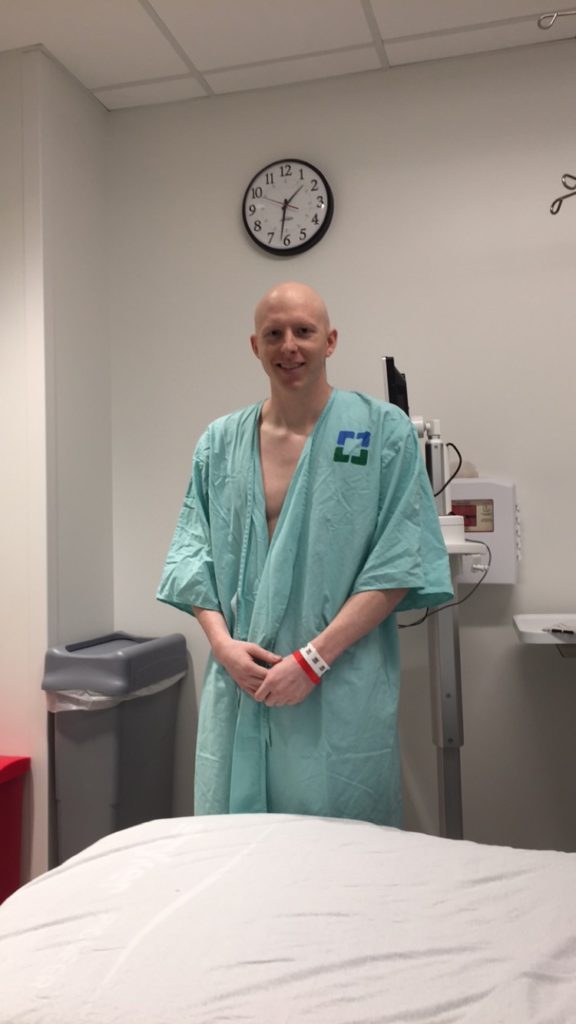
Guidance on getting through the near week-long hospital stays
You have to look at the bigger picture. I know it’s tough in the moment. A lot of times we get so caught up in the moment thinking about three-day hospital stays, ten-day hospital stays, when will I ever get out of this?
Think of it this way: it’s setting you up for something bigger in your life.
Yes, it’s tough in the moment, but I was relying on my faith and support system, focusing every single day on one little thing that could help move me forward to getting out of the hospital or getting me to where I needed to be.
It might be getting up and walking on a day I feel a little better, or eating something and getting some calories in my body, whatever it was.
That really helped me to relieve a lot of emotional stress of being in the hospital all the time. I was keeping myself busy and trying not to constantly focus on the negative parts of this journey.
»MORE: Mental and emotional support when leaving the hospital
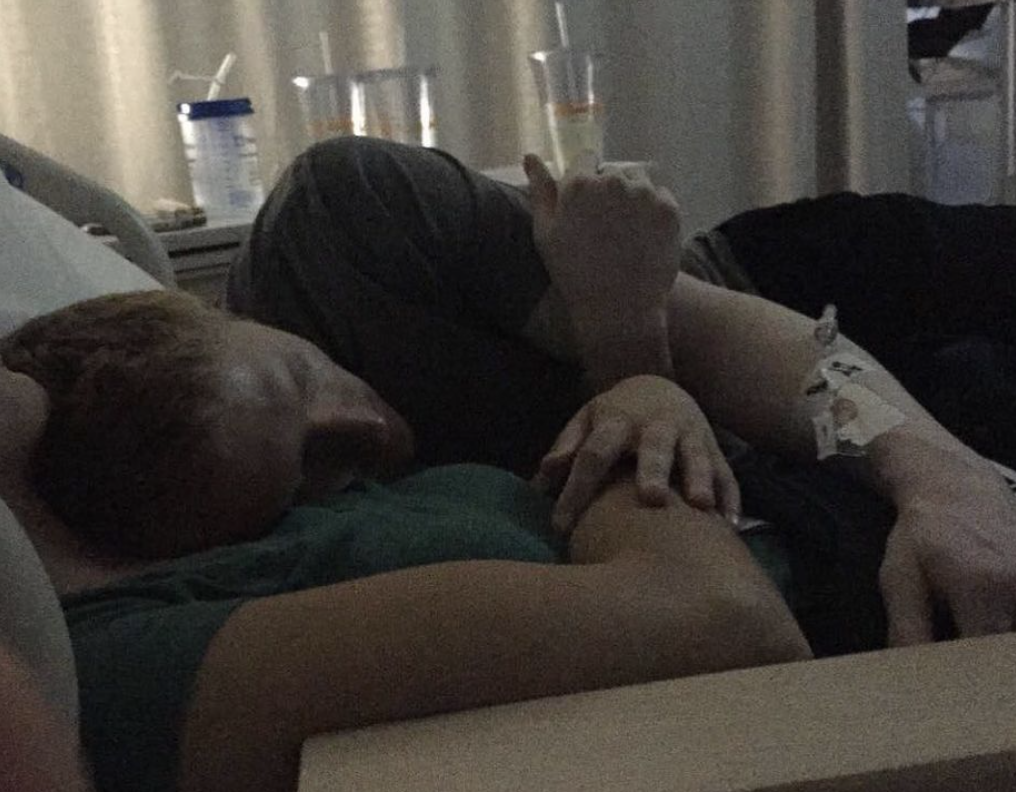
What was the hardest part of the chemo
It was a tough first week mentally because I was still wrapping my head around a lot of the things going on. As I was doing it, I had Lauren and my parents with me. That really helped me a lot. It was a lot to go through.
I have red hair so losing that hair was really challenging. I ended up losing the hair around the second round.
In the middle of my third round was my biggest mental hurdle for sure.
I ended up losing my three-year-old puppy because he had cancer. I took him to medical appointments before I was even diagnosed. He and I were fighting this battle together.
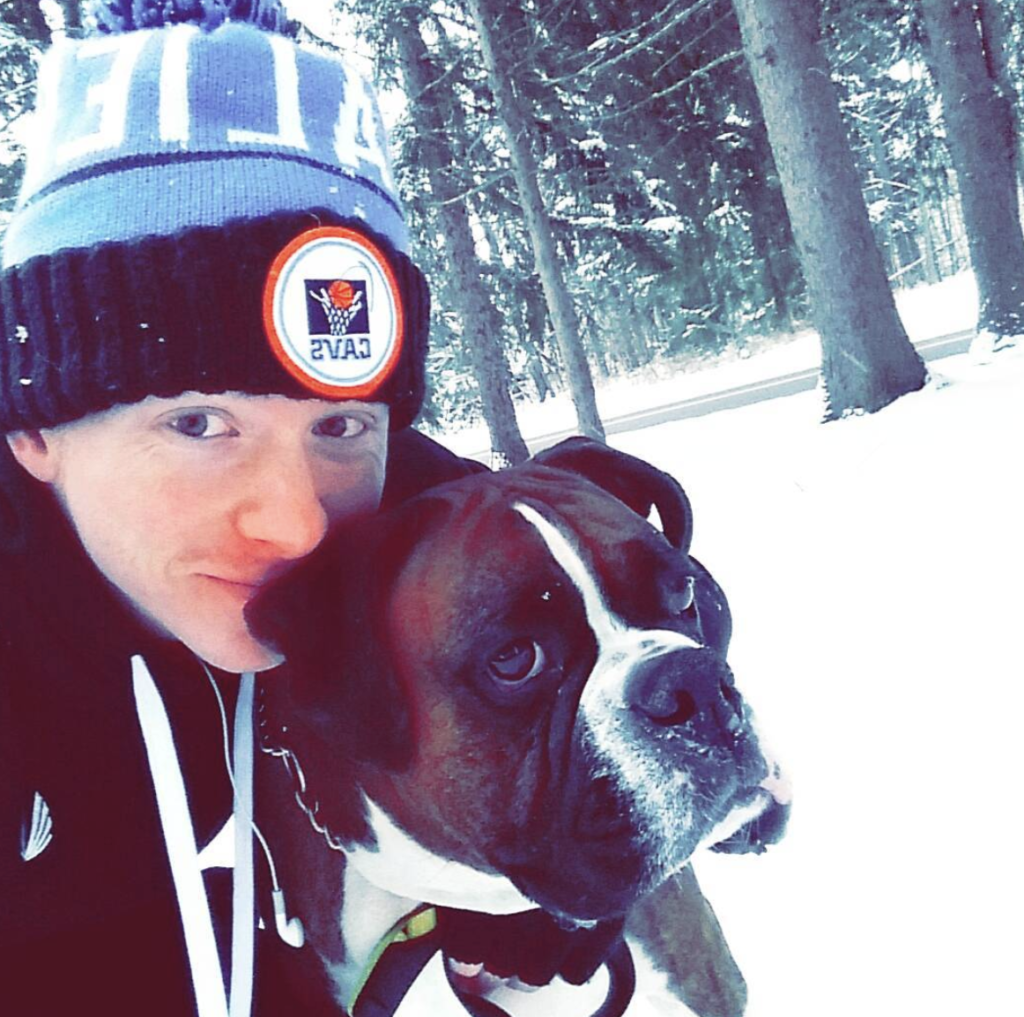
That was my first bout of saying everything was happening to me, not for me. I started to blame God and not want to go to chemo. I was so upset for four to five days because I thought the universe hated me. I thought everything was going wrong.
That was a big turning point in my life because I remember the day I was lying in bed, looking up, and thinking if this is what Duke, my puppy, my parents or Lauren would want me to do? Give up on myself?
The answer was absolutely not.
That day I got up and just did something small. One little thing every single day just to get me to eventually get out of chemotherapy. It was a big mental shift for me.
Describe managing the hair loss
Eventually the hair started coming out in clumps. I started looking like Gollum from Lord of the Rings! It was really bad but I kept some humor in it.
I had this crazy dirty mustache with a little bit of hair and said I was going to keep it while I shave my head, for however long I possibly can. I didn’t know how long it’d be but I’d do it for as long as I could.
All my friends noticed and said they wouldn’t let me do that alone. They all grew mustaches, all my guy friends and dads, throughout my chemotherapy. It was really cool and so powerful.
It was amazing to see that. Yes, it was really challenging because I was afraid of showing my bald head in public, I was wearing hats for two weeks at least.
»MORE: Patients describe dealing with hair loss during cancer treatment
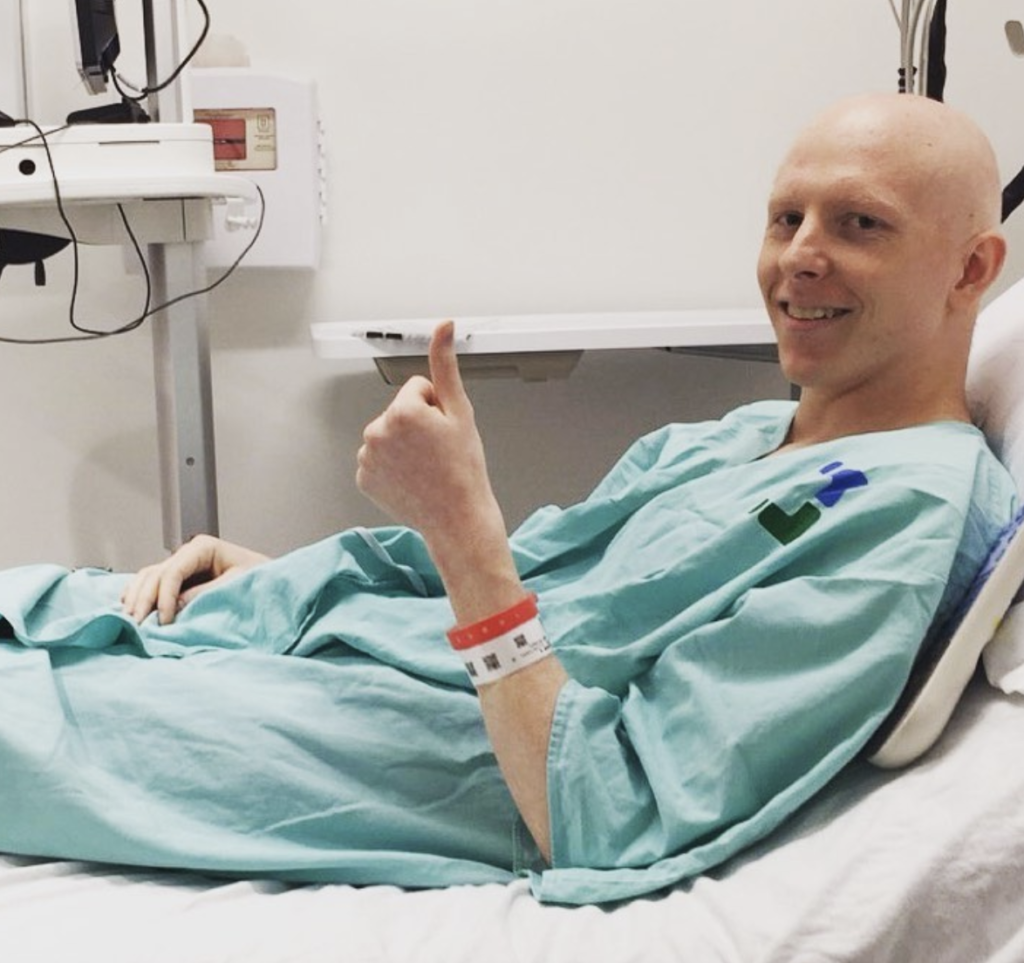
Shifting your perspective on not having hair
Eventually, I realized there was nothing to be ashamed of. I think so many of us, and this can go in any direction in life, not just cancer, we’re afraid of what other people think of us that we literally dictate our lives around other people’s opinions, actions, and thoughts.
I thought look, I’m going through cancer. I’m going to express this, I don’t care if people come up to me or look at me weird. I don’t care. I’m going to do it for me, that’s it.
I stopped wearing hats and it was a big opening for me to relieve that pain that I’d been going through for a lot of years in my life before cancer, needing constantly to fit into certain groups or being around certain people.
The hair loss was really challenging. I know for women it may be even more challenging. I’m very empathetic to that. Cheers to you. I understand why there are so many people going different directions with the hair loss.
Any last guidance on recovering from chemo at home
If you have somebody who’s there for you, make sure they help you stay on top of things. My dad was like a second nurse to me. He knew everything. As crazy as this is, throughout my journey, nurses would come in and ask if my dad was also a doctor.
He’s one of those people who needs to know all the information. When he does, he’s very smart and intelligent, and always stays on top of things. He would make sure I took all my nausea medication.
You don’t have to have someone like that, but have someone in your life who will help you because there will be days where you easily forget things.
It’s such a challenge because you just want to be able to get up and do things. On the days I started feeling good it sucked because I’d have to go right back to chemotherapy. The next Saturday and Sunday I’d feel much better.
For me, some days I’d even go to work. For some, you can go to work. Go out and do things, live your life. If you’re feeling good that day, don’t sit around. Go out and go for a walk, go to work, just be present.
I know COVID-19 has been challenging for a lot of people right now. You can’t go places because of your compromised immune system and you have to be careful, but just get outside the house and walk outside. Fresh air is the best medicine there is.
For me, it was going to work or being around other people and making sure that I wasn’t just sitting around and moping all day.
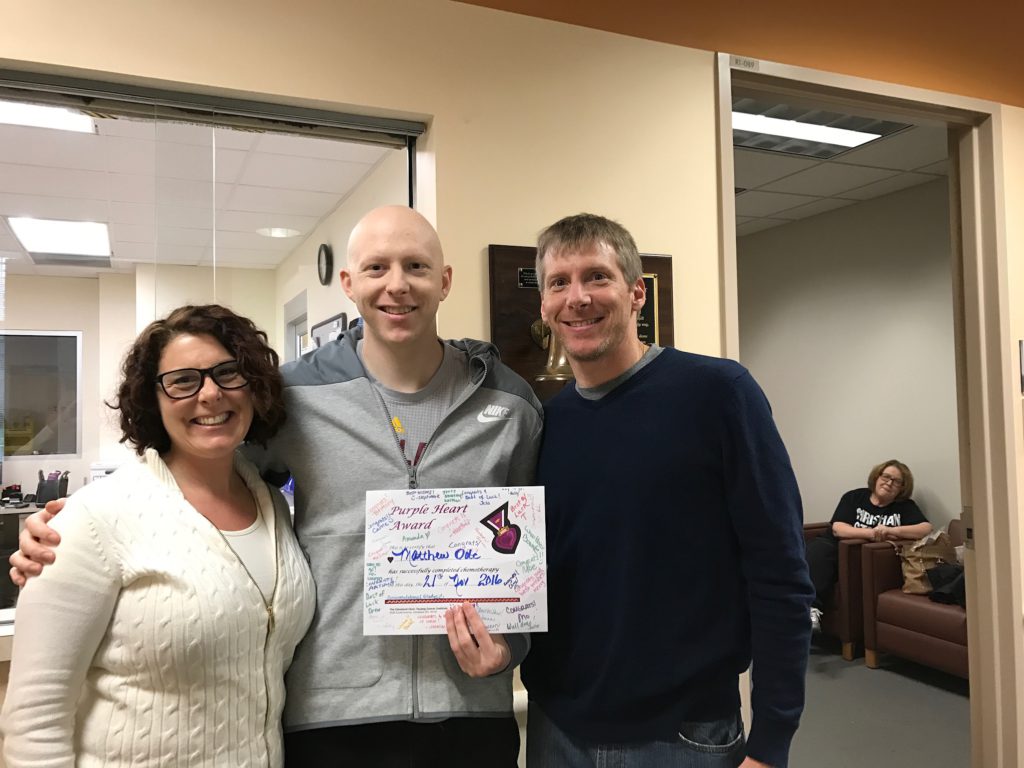
How did you process the end of chemotherapy
It felt like accomplishing Mount Everest, in a sense. It was such a tough whirlwind of almost three months. I had all the nurses sign the “End of Chemo” certificate with the date on there, November 21st, three days after my 25th birthday.
For my birthday celebration, my friends threw a surprise party for me and there were about 50 people who showed up, it was incredible.
Three days later, I felt like okay, it’s downhill from here. That’s what I thought! I was thinking about crushing the next step, let’s do it, I know I potentially have to have a surgery but let’s go for it.
It was a really good day to celebrate and to just put life into perspective for me. It put life into the perspective of all of the things I used to worry about, all the people I used to try to please, or all the things in my life I thought were so important, they just weren’t.
You realize all the people who truly are important in your life, you realize the events that are really important in your life, and you realize that it’s not as many things as you think.
When you narrow it down, it’s very simple but we overcomplicate things in life.
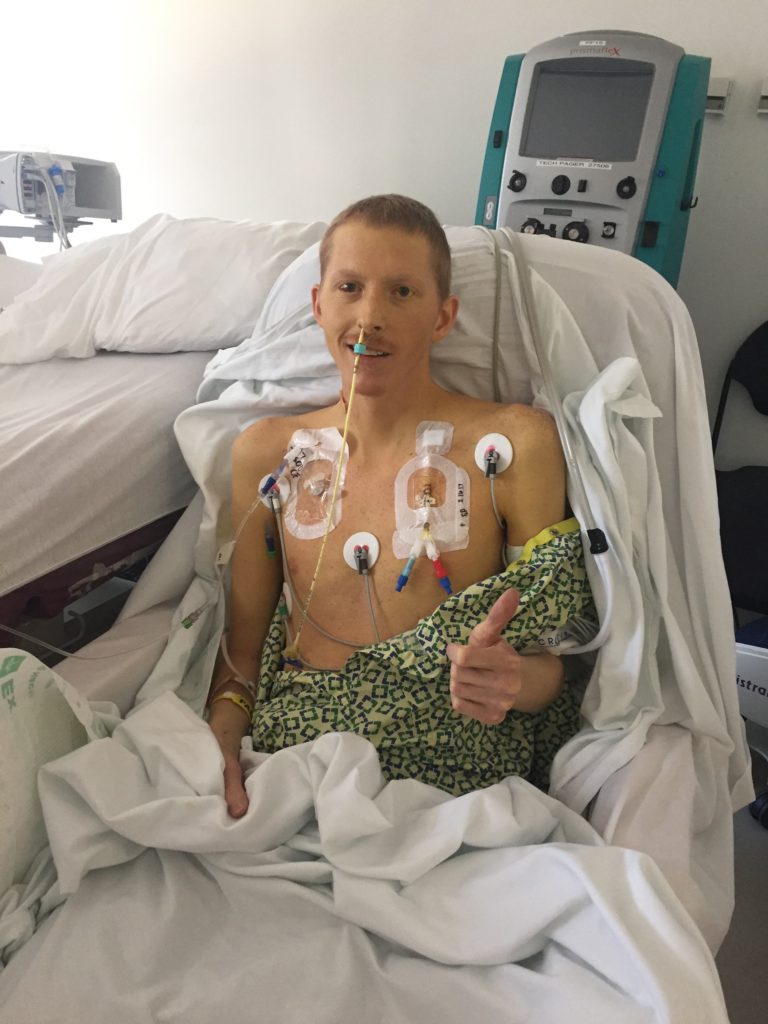
Surgery & Complications
How did you learn you needed surgery
About three weeks later, my oncologist said there was good and bad news. The good news was that my tumor shrunk from 11 centimeters to three centimeters.
The bad news was that my tumor was wrapped around the inferior vena cava. That’s the central vein that goes from the bottom of your upper body to your heart.
My oncologist said we’d need to do a ten- to twelve-hour surgery with four different surgeons involved to remove the tumor, potentially remove the vena cava, and all the cancer in my body.
They scheduled an appointment two weeks later for the surgery. Those two weeks were some of the longest days of my life.
I wanted to get it over with, there was a lot of stress and anxiety. Finally, the day of surgery came.
»MORE: Dealing with scanxiety and waiting for results
Preface: what happened is extremely rare
What I want to share is this is not the journey you will be going on. I’ve never heard anybody go through this journey that I had to go through.
For me, I think I’m crazy and I think it was God saying I need to put you through this insane journey in order for you to do what you want to do with your life, in order to have the perspective and have the vision that I need you to have.
I’m more or less sharing this for the message of resilience, and giving you hope and positivity for whatever you’re going through. This is not to say this will happen to you.
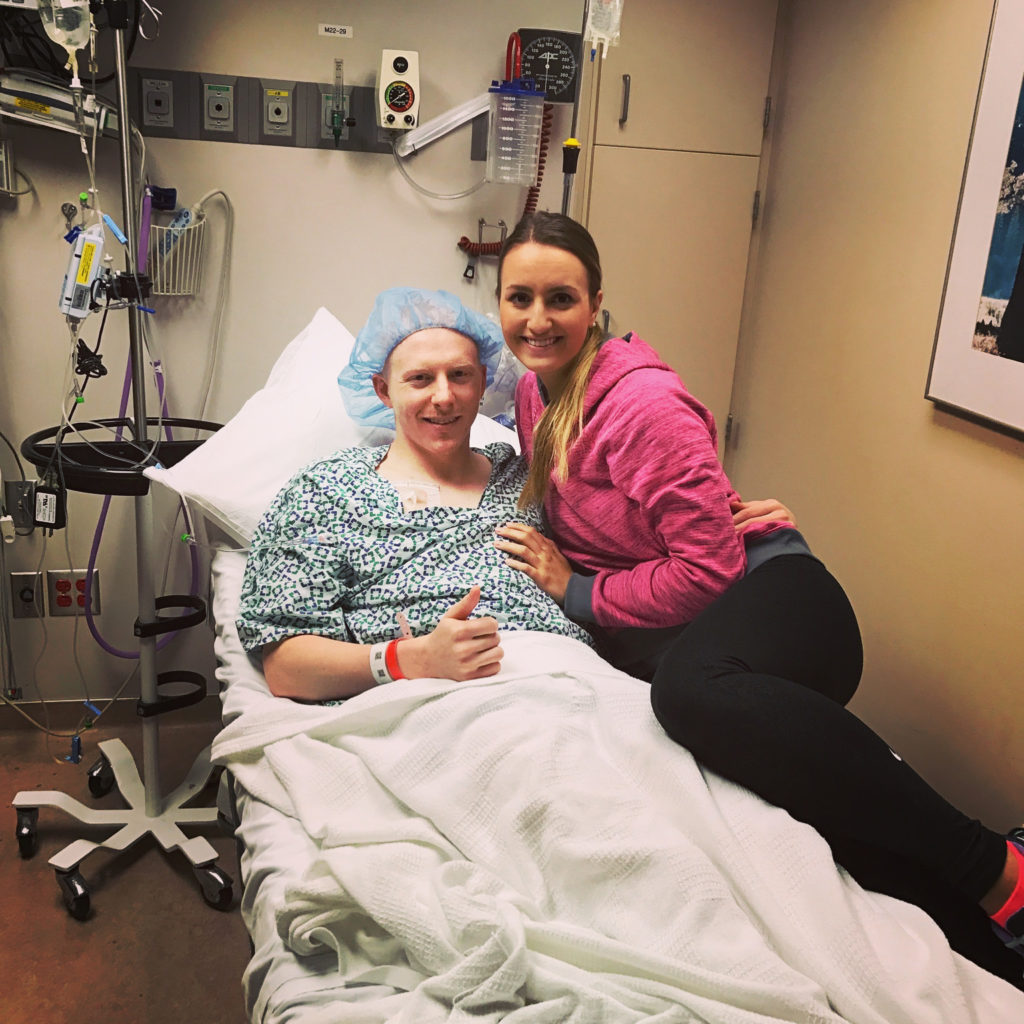
What do you remember from waking up from surgery
I get the surgery, about 11 hours long. I remember I was with Lauren, saying good-bye to everyone, including my grandmother, my aunt, my dad, and Lauren. I got into the surgery.
Next thing I knew, I was waking up three days later. Going into the surgery, I was around 145 pounds, so I’d lost about 40 pounds throughout chemotherapy.
During the surgery, they had opened up my hip left to right, took out the vena cava, rest of the cancer and tumor, and when I woke up, I was close to 200 pounds.
What had happened was my body went into this survival mode and caused massive swelling in my stomach.
I remember waking up, not being able to move or do anything. I was asking my doctor if this was normal. He said it wasn’t, but the draining should eventually come out of my stomach.
Falling into two comas
A week goes by after I left the hospital, and throughout that week, when I was home, I never felt right. I felt something was totally off. I knew it had been a big surgery, but there was something not right.
As the draining was coming out of my stomach, all of a sudden, it just stopped. Immediately, I was in so much pain that they had to rush me back to Cleveland Clinic.
They ended up having to drain seven liters of fluid out of my stomach, caused me to go into a complete kidney and liver failure, I had a cone drilled inside my head to relieve potential brain swelling, i had a catheter in my chest and in my neck, because they thought I’d be on dialysis for the rest of my life.
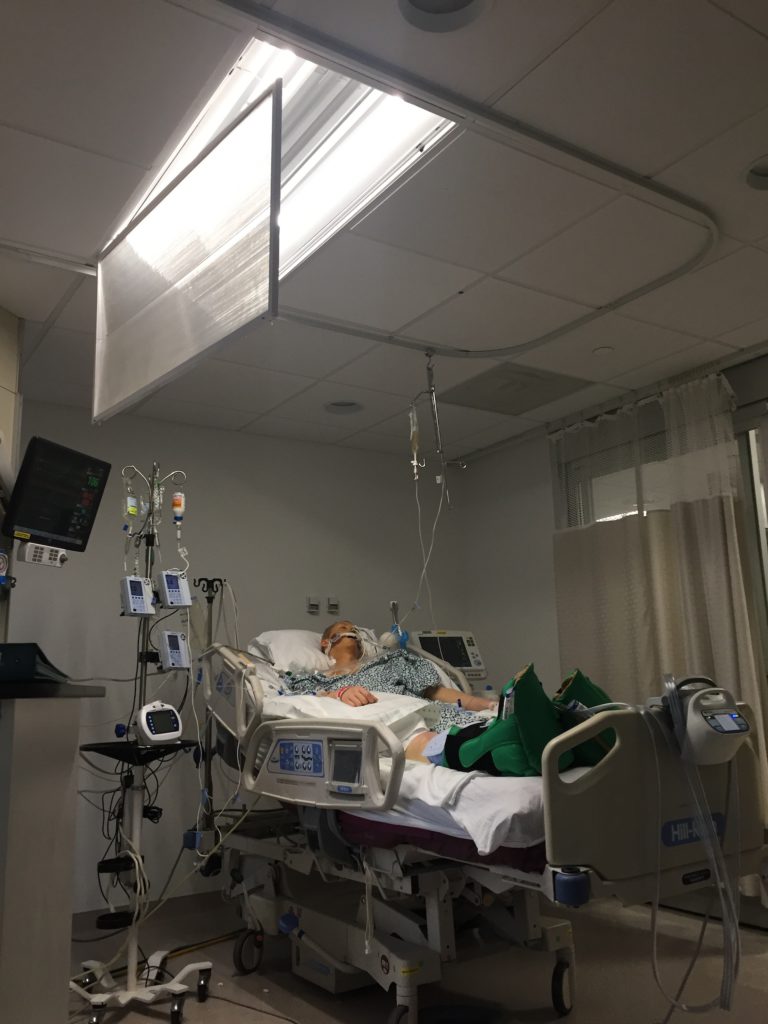
I ended up falling into a two-week, non-induced coma. I won’t go into crazy detail, but long story short, I ended up being in the ICU for more than 40 days. I ended up being in the hospital for 53 days total. A week out of my coma, they went to go take out the catheter in my neck after taking out my breathing tube.
I end up having an arrhythmic heartbeat as they’re taking out the catheter, and am going into cardiac arrest. They had to do eight minutes of CPR on me and I had to go into another one-week coma.
Waking up
When I woke up, it was Valentine’s Day. January 6 was my first surgery, I went back in two weeks later, and now it’s February 14. After that, I remember waking up and saying okay, I have to relive my entire life again. I couldn’t move my fingers or anything.
I remember waking up to flowers and hearts. Lauren and my parents never left that room for those two weeks, they did not leave it when I was in my coma.
When I got out of my coma, my dad never left that room. Lauren and my mom would have to go and do some things. When I went into another one-week coma, it happened all over again. There was so much support, with people coming in and praying for me.
When I was in my first coma, my mom had people go to church and had these massive prayer services. She did three of them where hundreds of people would pray for me.
In the middle of the last prayer service where people prayed for me is the day I woke up from the coma. I woke up with Lauren holding my hands. Every day she’d walk up to me and hold my hand, saying, “Matt, wake up.” She’d tried to see if I would wake up.
For me, all this was God saying that this wasn’t the end of my journey. It was the beginning.
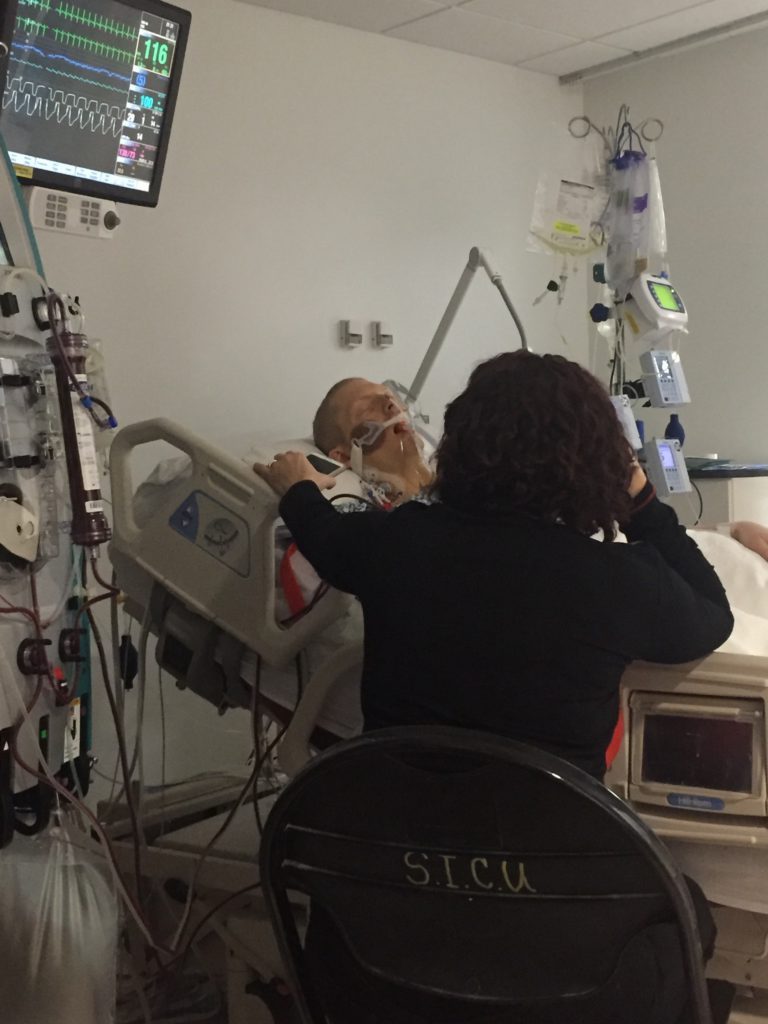
How did you learn you had no evidence of disease (NED)
My urologist told me about the no evidence of disease, as he was the one who performed all five surgeries on me.
Significance of day you were discharged from hospital
When I was released from the hospital after 53 days, it was March 17, 2017. The coolest part about it is I had met Lauren on March 17, 2016, exactly one year from when I was released from the hospital.
I know it’s not a coincidence. I think that was God putting an angel in my life. Sometimes we need to recognize who that person is in our life. When we do, sometimes we take them for granted.
We can’t take that person for granted too much. We have to really appreciate them being in our lives.
What was the follow-up protocol
It was every three months to start for the first two to three years. Then it got to six months. Now, it’s more like eight months.
The cool part about it is since I am four years officially cancer-free, with testicular cancer, unless they see something weird, I don’t have to do another CT scan again. It’s only blood work moving forward, which is awesome so I don’t have to go through the radiation part of it.
Video: Matthew’s Reflections
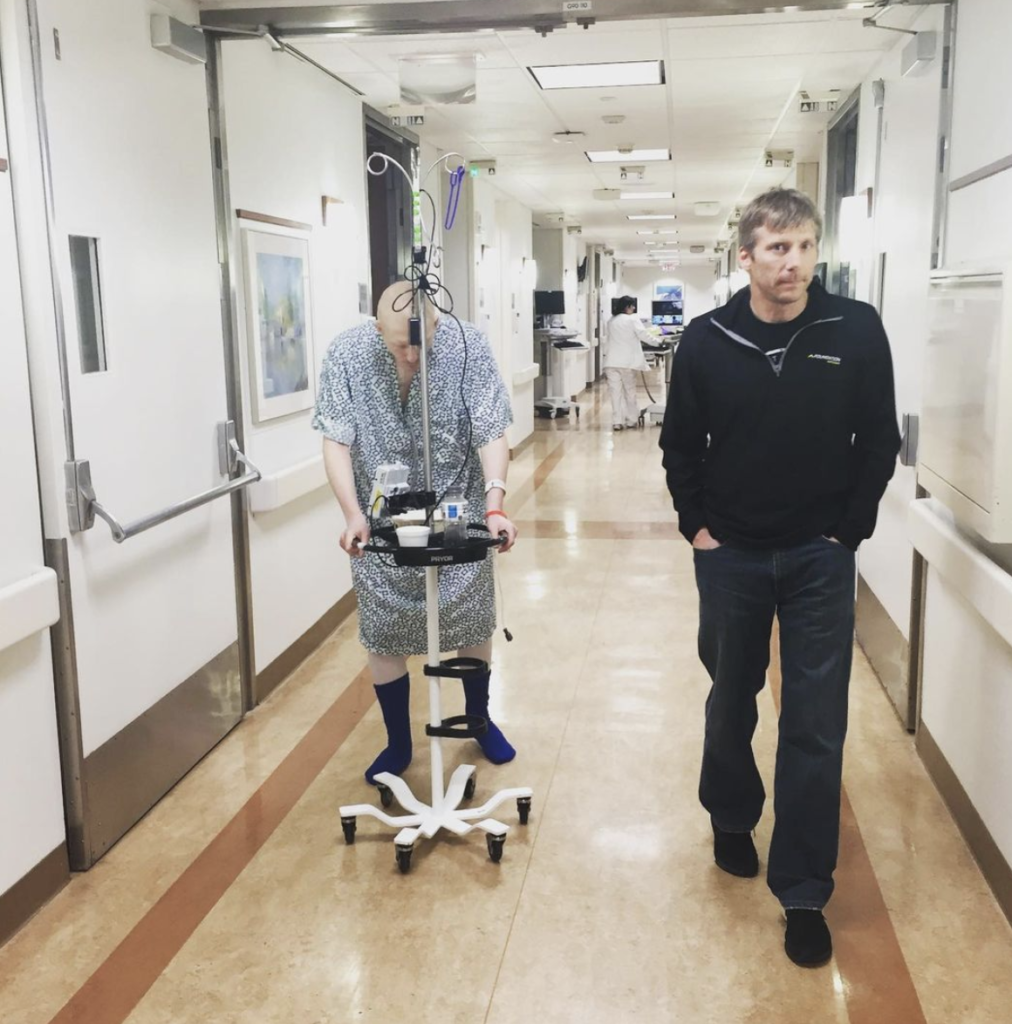
Reflections on Cancer
Recovering at home from so many surgeries
Coming out of that hospital was not rainbows and butterflies, it was a challenge. I was 110 pounds, I was skin and bone. I had an open scar across my stomach.
The problem with me is I didn’t have the nurses and the doctors to hold me accountable anymore. I had to do all my physical therapy on my own. I started to, for a good two weeks, get into that excuse mode.
Within two weeks, I was back in the hospital with a standing heart rate of over 150 beats per minute, my fever was over 102-degrees, my blood pressure was through the roof. I stayed there for a good three to five days to get everything done.
When I got out of the hospital, I sat down with Lauren. We had a discussion about how if I would keep making excuses and not take care of myself, I wouldn’t be here next month or six months.
It wasn’t a bad conversation, it was exactly what I needed.
I probably cried a good hour-and-a-half that night. I let all my emotions out.
The next day, I got into my little weight room at my house and picked up a five-pound dumbbell, and started doing bicep curls. The next day, I did the same thing, walked a little farther, and every day it was just compounding and compounding.
Eventually, I started gaining some weight. Then my mental attitude started to get stronger. I started to look at life as a lesson and as a growth opportunity.
After one year, my wound finally healed. My skin grew over it. After two years, my strength started to come back. I told myself that I would not let myself down. I would work my butt off every single day. I focused on consistency and using my dedication to never giving up on myself.
After about two-and-a-half to three years, I was able to take care of my mental, emotional, and physical health. I wondered what was next for me.
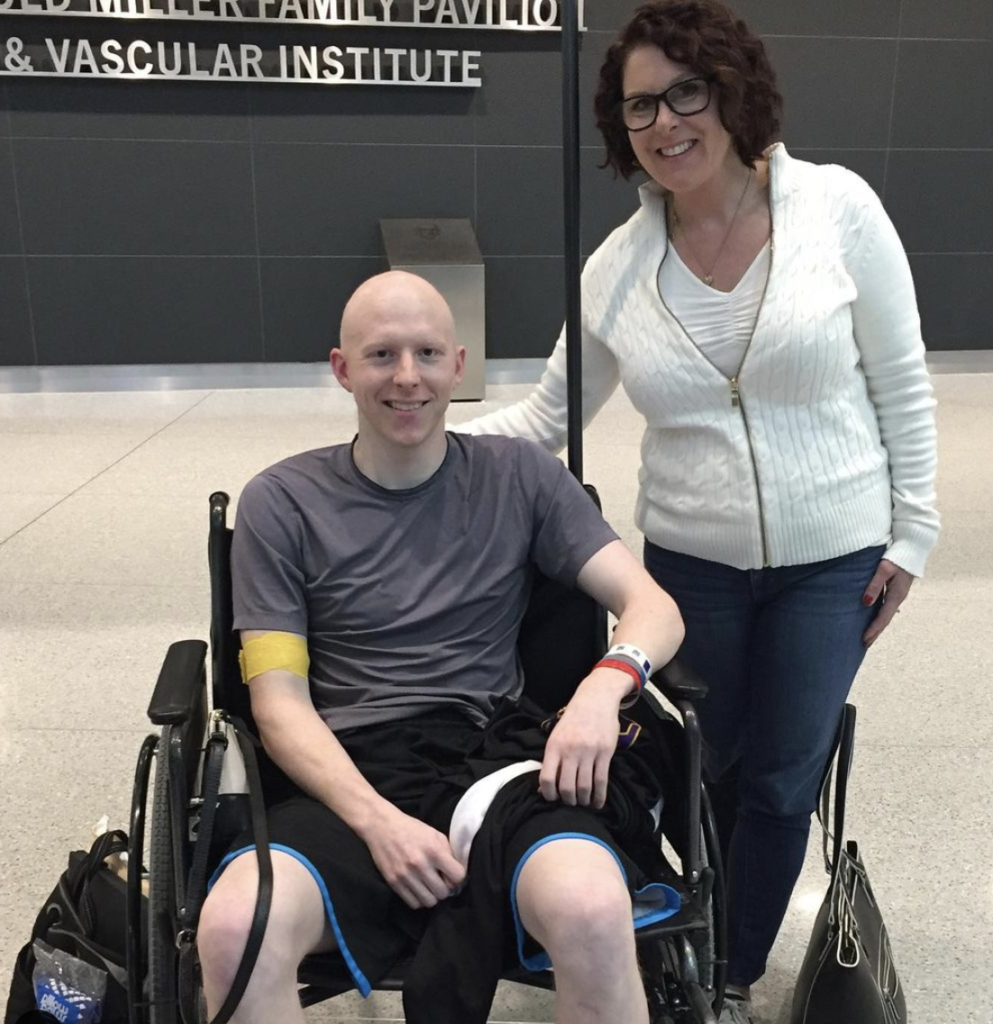
Cancer led to your new purpose
I think for a lot of us survivors, even if you’re going through cancer right now, you could start to feel this or will start to ask, what is next?
I didn’t go through this crazy challenge just to go back to my normal life. I have something so much bigger to offer to this world, but I had no idea what to do.
I started to surround myself with like-minded people. The biggest thing that ever happened to me in my entire life is if you want to change the direction of your life, be around people who are going to help you get there.
I don’t want this to sound bad or mean, but I had to stop hanging around with certain people I used to all the time who wanted to go and drink every weekend.
I had to stop listening to people who really loved and cared for me and thought I was crazy for not going back to my nine-to-five job, and for wanting to do something bigger with my life.
What I got around was entrepreneurs because they all had this growth mindset of having a vision and wanting to get there. If you have a big dream in your life, the only person who’s going to believe in you at first, is you.
You need to be the one to have the courage to go forward. That’s where faith comes in and where you believe in yourself, having the courage to push yourself forward.
You turned this new purpose it into your work
As I started sharing my cancer story like I am now, people were like okay, you need to get that story out to the world and become a motivational speaker. So I started my own LLC and I became a keynote, motivational speaker.
I was talking on stages and on Zoom calls, then COVID-19 hit. It stuck a wrench in the plans so I asked what was next. We all have setbacks and different directions we go in in our lives.
I started coaching other survivors and I started coaching other patients to do exactly whatI’m doing now, figuring out our path in life.
It brought me to so many avenues. I just created a Facebook group for cancer patients, survivors, and caregivers of all ages.
I was really nervous. It took me three months to have the courage to do it. We now have more than 1,100 people in the group and it is just absolutely incredible. I can’t explain it.
That’s my journey of resilience and how cancer has really brought me to figuring out what I want to do with my life. I’m not saying you have to go on these grand stages or anything.
Maybe it’s being a better mother or father, or putting perspective and gratitude into your life to just become a better version of yourself, maybe helping one or two other people on the way.
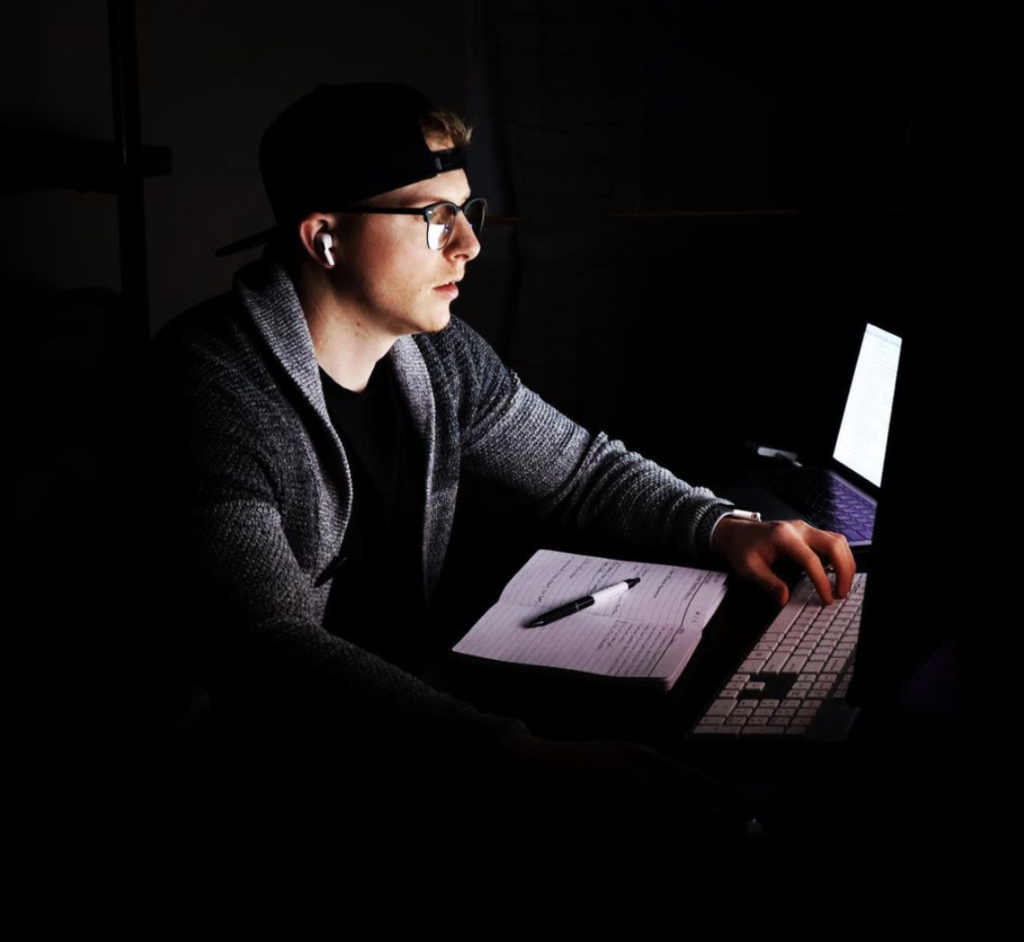
True happiness comes from giving back to other people in a way that you’ve learned from an experience you went through, a challenging experience.
One of my favorite acronyms is “H.O.P.E.” It stands for “help one person everyday.” It doesn’t have to be anything massive, it’s just doing something to make an impact in this world. You’ll bring a lot more joy and happiness to your life.
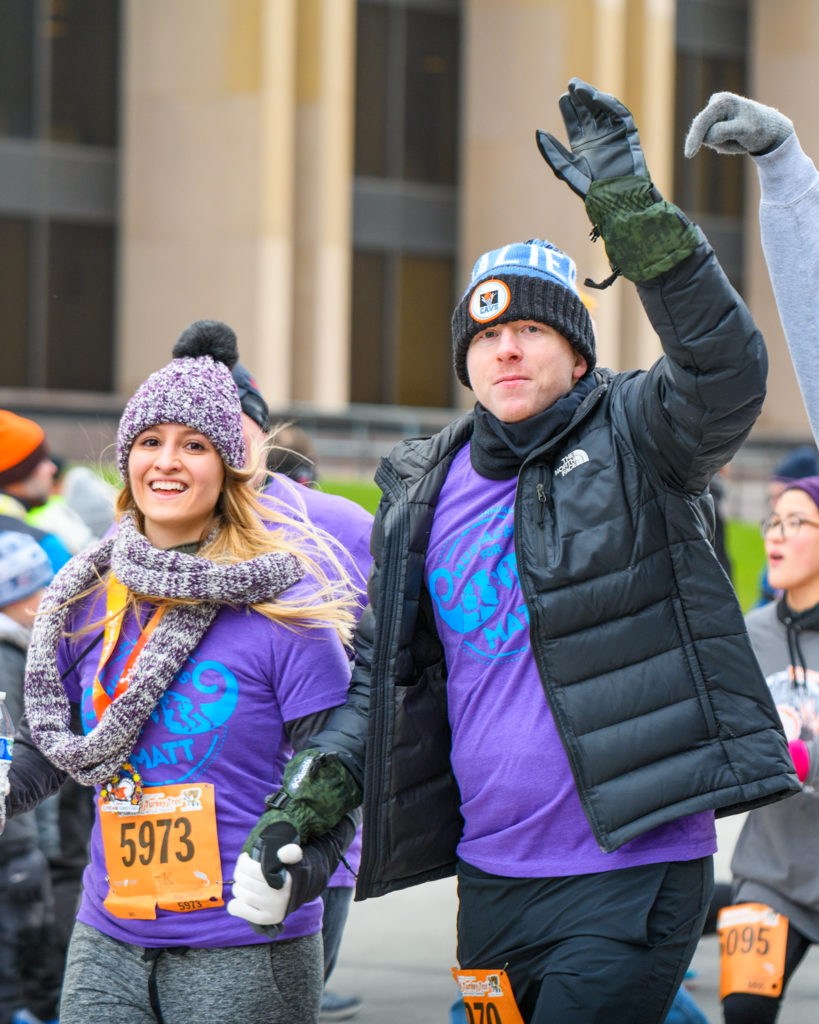
Describe the significance of the support you received
This 5K was very special. It wasn’t just about this 5K. This is when I grew that mustache and all of my friends grew mustaches, too.
When I finished chemotherapy, my dad said we’d host an event Thanksgiving morning, because I finished chemo on November 21, and have people go to Cleveland for a Turkey Trot.
It’s a 5K or 10K race where thousands of people show up. It happened at seven in the morning, it was 34-degrees, we had no idea how many people would actually show up. It’s okay, we’ll give them free t-shirts.
We had more than 400 people show up to this event, which absolutely astonished me. It was incredible! We ended up calling the event, “Mustaches for Matt.” That is the reason, because I lost all my hair, so everyone grew mustaches.
It was really powerful because all the girls wore fake mustaches and the guys grew mustaches. I didn’t even know 200 of the 400 people who were there, just to show how much support and love there was.
You have so much more love and support in your life than you could ever imagine and you don’t know about.
They told me people were praying for me around the world in Africa, Europe, Asia, Australia. How did my story even get out there?
It just goes to show the power of having people in your life and having that support.
That picture was the third time we did the 5K. Every time, we’ve had hundreds of people show up and wear the shirts. It was special because I had to learn how to walk again and to live my life again.
That one was my very first time running the 5K after cancer. To do it holding Lauren’s hand was just too powerful and very emotional. It was an amazing day.
I was about to host my own Mustaches for Matt race and bring money to charities, but unfortunately COVID-19 hit and we couldn’t do it. Hopefully one of these next years, we’ll be able to get it back up and running.
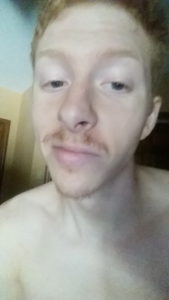
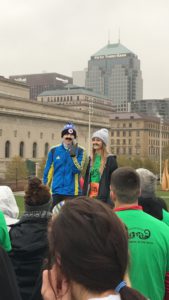
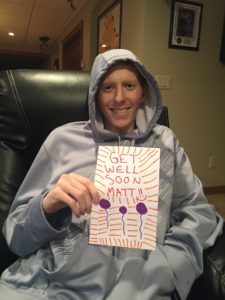
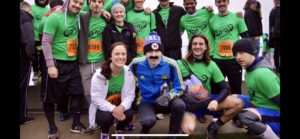
What’s your last message to other cancer patients and caregivers
You have so many opportunities in your life to do great things for yourself. Don’t be afraid to go after them.
It’s scary at first but just take that leap of faith and you’ll be amazed at what it can do for you.
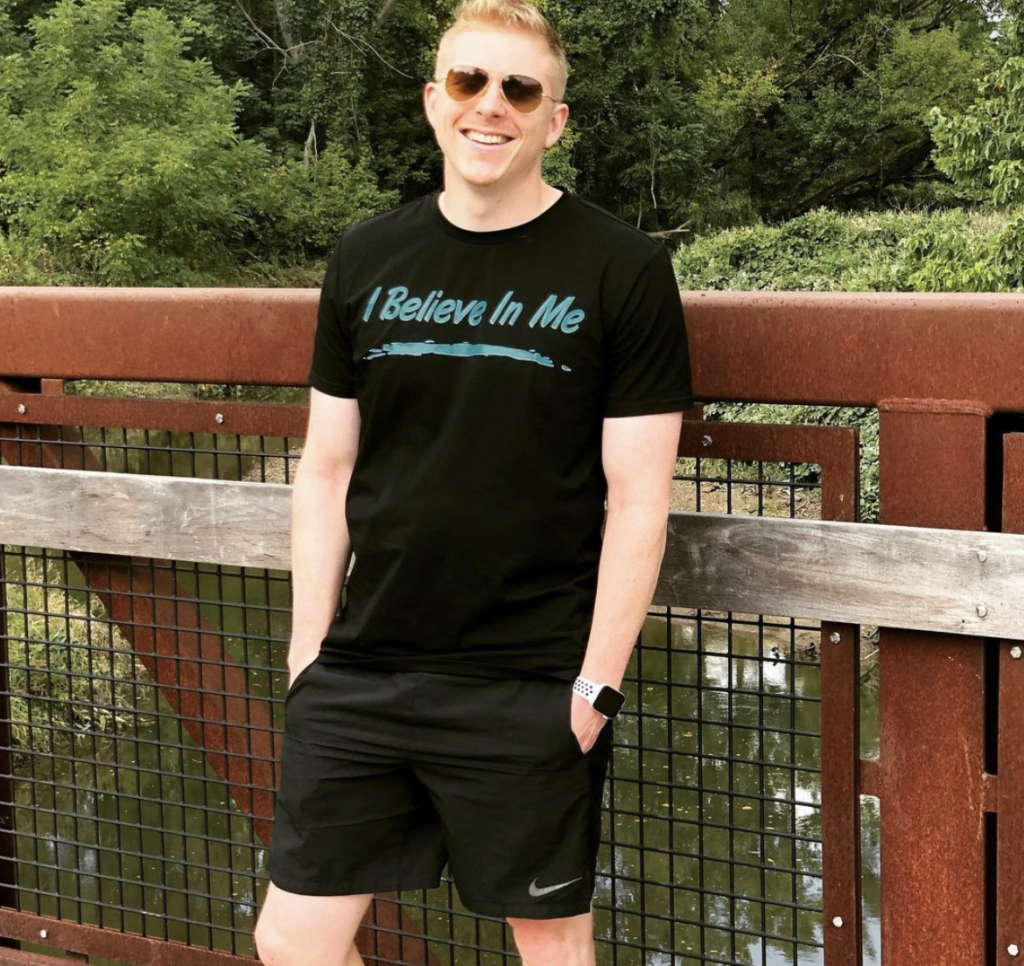
Inspired by Matthew's story?
Share your story, too!
Non-Seminoma Testicular Cancer Stories
Matt B., Testicular Cancer (Embryonal Carcinoma, Metastatic)
Symptoms: Severe lower back pain, loss of sensation in left leg, dizziness, fatigue, night sweats, heart complications
Treatments: Surgeries (retroperitoneal lymph node dissection or RPLND, orchiectomy, liver resection, hernia repair surgery), chemotherapy
Josh T., Testicular Cancer, Stage 3A
Symptoms: Pain in his chest, lower back, and abdomen; shortness of breath, especially during exercise; mass found on one testicle
Treatment: Chemotherapy
Steven C., Testicular Cancer (Non-Seminoma), Stage 2B
Symptoms: Enlarged left testicle, tenderness in left testicle, lump in back (retroperitoneum)
Treatments: Surgery (orchiectomy and retroperitoneal lymph node dissection), chemotherapy
Matthew O., Testicular Cancer (Non-Seminoma), Stage 3C
Symptoms: Fatigue, one swollen testicle
Treatments: Chemotherapy, surgery
Hugo T., Testicular Cancer (Non-Seminoma), Stage 2B
Symptom: Pea-sized lump on right testicle
Treatments: Surgery (removal of right testicle, lymph node resection), chemotherapy
Steve L., Testicular Cancer (Non-Seminoma), Stage 3C
Symptoms: Grape-sized tumor on neck; hip and pelvis pain; tumor on right testicle
Treatments: Chemotherapy, surgery (removal of right testicle, lymph node resection, and tumor dissection in the neck)
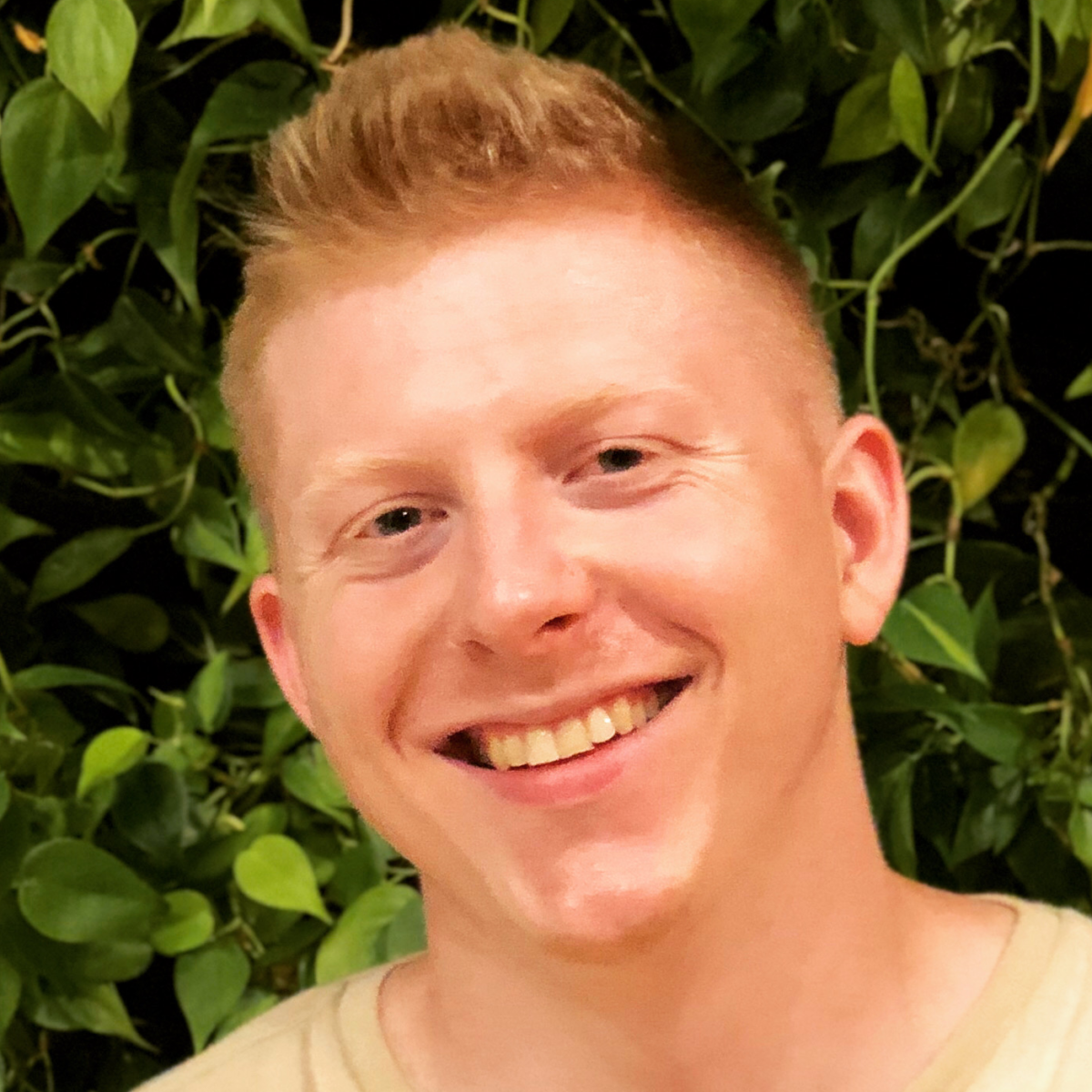
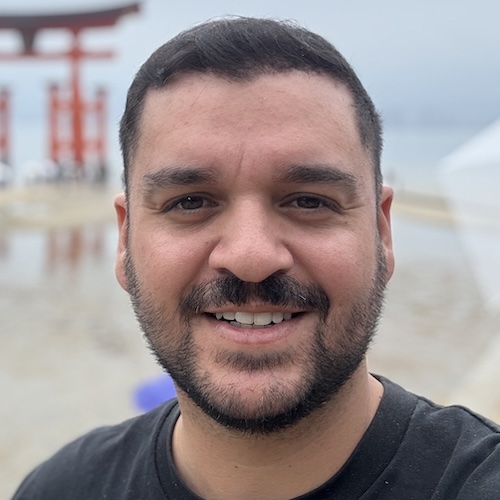
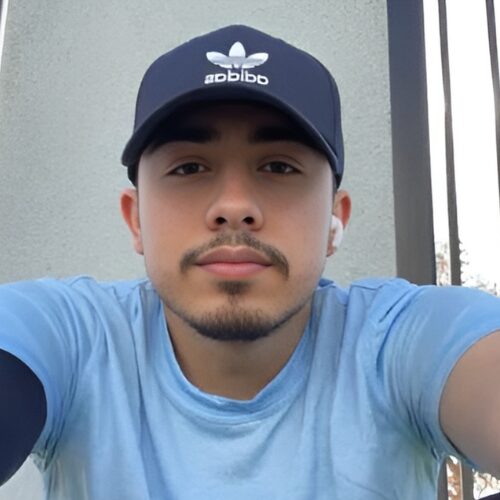
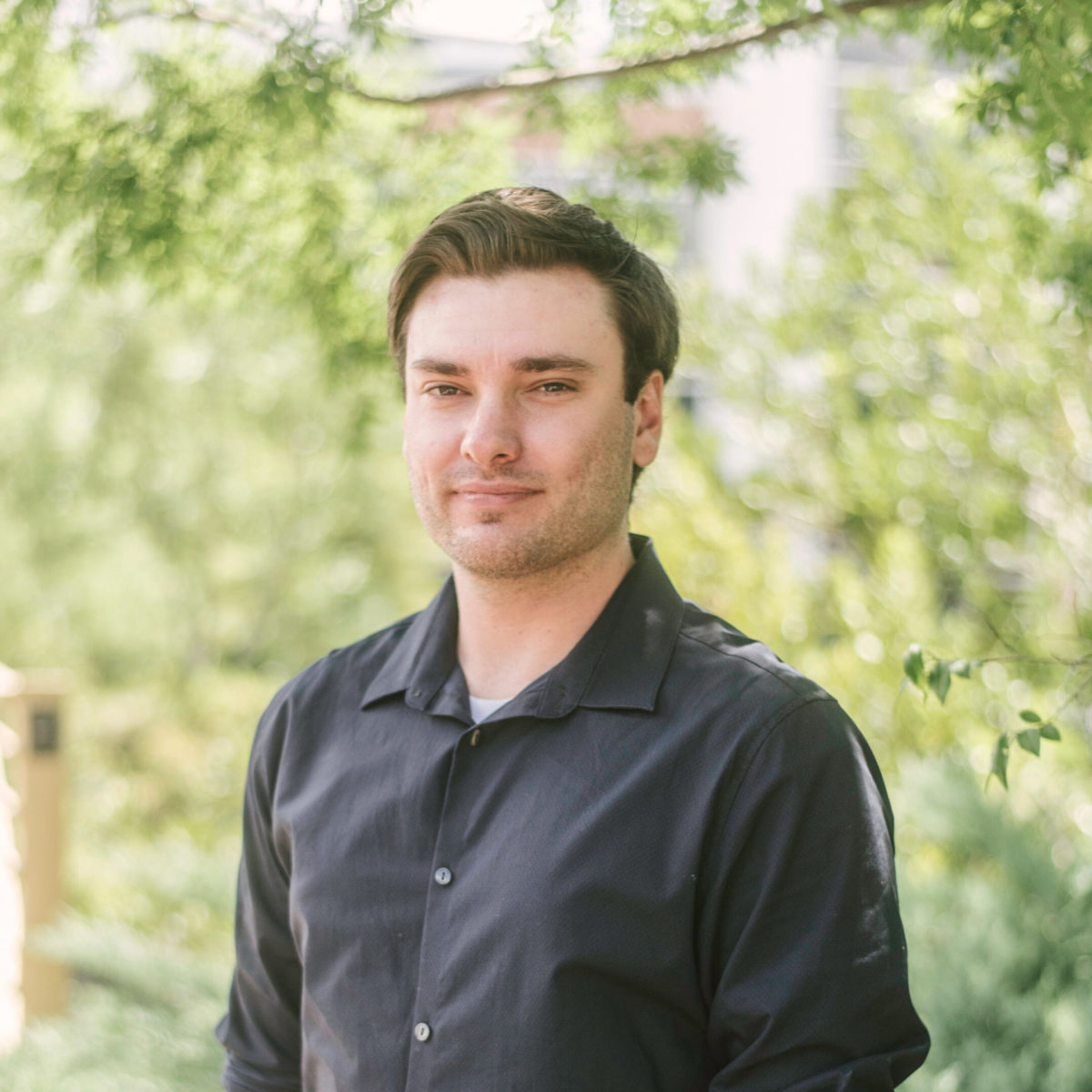
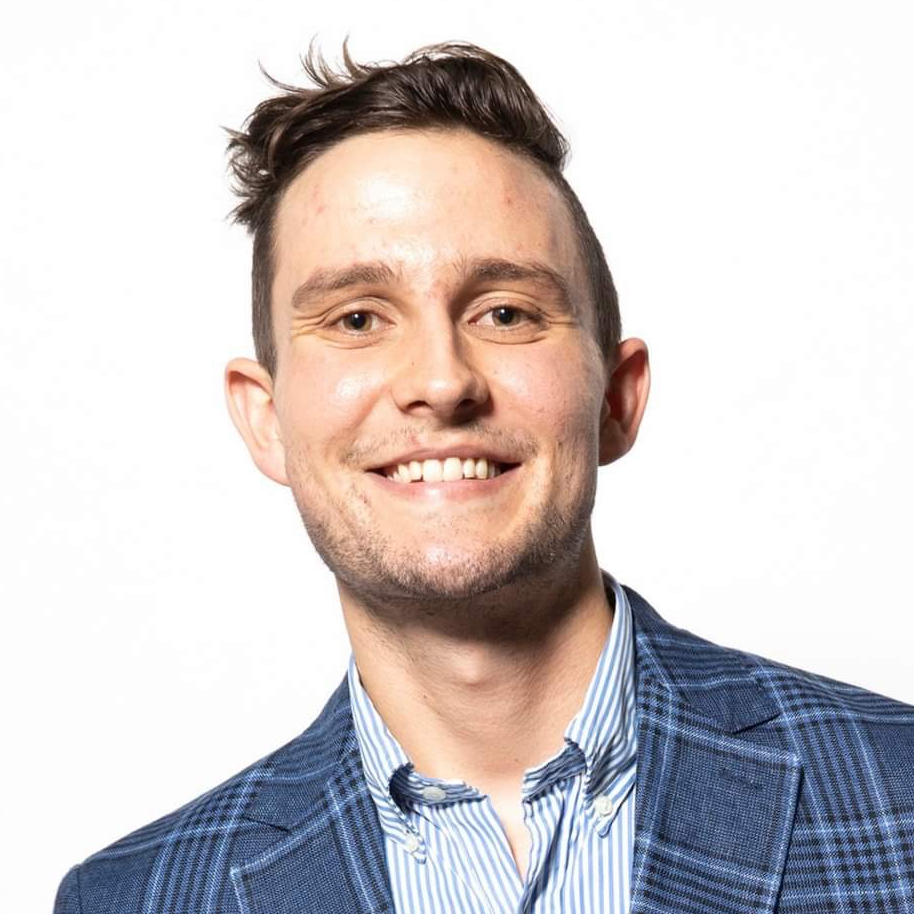
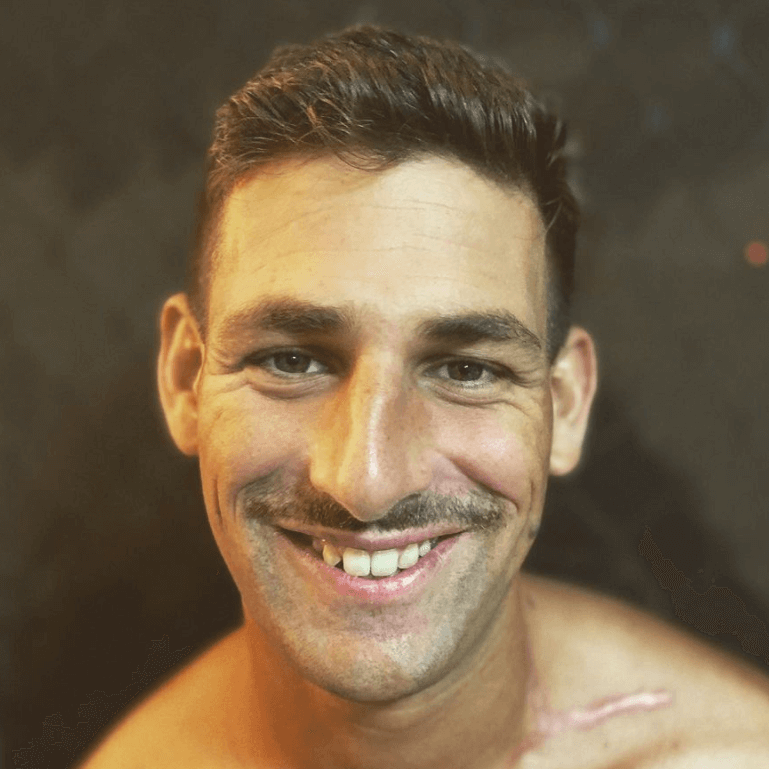
2 replies on “Matthew’s Stage 3C Non-Seminoma Testicular Cancer Story”
Thank you so much for sharing Matthew. I’m so sorry your journey was as difficult as it was. I’m 2 years testicular cancer free and 3 rounds of chemo was hard on me. I pray for continued good health, you got this!
Hi I have a very rear story but I believe it can contribute to all these incredible stories that were told here. I’m 41 and have been going through rare issues in my testicles which at first I was very I’m Imbarrased and didn’t want to tell anyone and now six years later I’m very open about it and I help others not to be Imbarrased. I don’t have cancer bit I have such a rare issue it makes me feel like I rather have cancer than going through this. Hope means everything